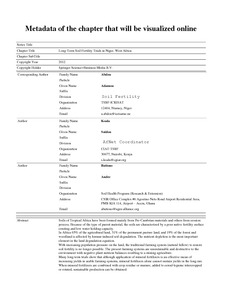Long-Term Soil Fertility Trials in Niger, West Africa
Abstract
Soils of tropical Africa have been formed mainly from Pre-Cambrian materials and others from erosion process. Because of the type of parent material, the soils are characterized by poor native fertility surface crusting and low water holding capacity. In Africa 65% of the agricultural land, 31% of the permanent pasture land, and 19% of the forest and woodland is affected by human-induced soil degradation. Nutrient depletion is the most important element in the land degradation equation. With increasing population pressure on the land, the traditional farming system (natural fallow) to restore soil fertility is no longer possible. The present farming systems are unsustainable and destructive to the environment with negative plant nutrient balances resulting to mining of nutrients. Many long term trials show that although application of mineral fertilizers is an effective mean of increasing yields in arable farming systems, mineral fertilizers alone cannot sustain yields in the long run. When mineral fertilizers are combined with crop residue or manure, added to cereal-legume intercrops or rotated, sustainable production can be obtained. Any future interventions redressing distorted nutrient budgets, to be sustainable have to develop an integrated nutrient management, conceptualized as the judicious manipulation of the nutrient inputs and outputs processes

